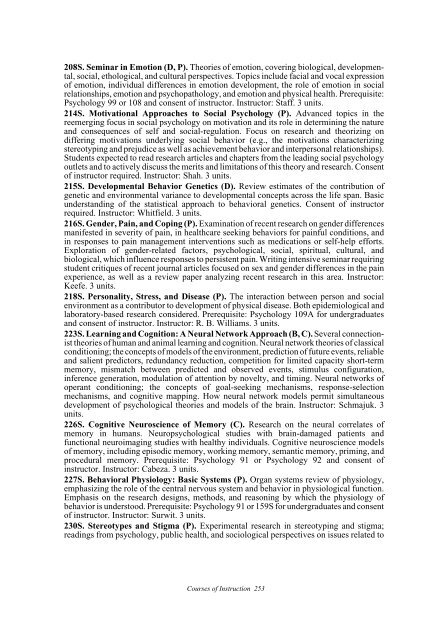Duke University 2008-2009 - Office of the Registrar - Duke University
Duke University 2008-2009 - Office of the Registrar - Duke University
Duke University 2008-2009 - Office of the Registrar - Duke University
Create successful ePaper yourself
Turn your PDF publications into a flip-book with our unique Google optimized e-Paper software.
208S. Seminar in Emotion (D, P). Theories <strong>of</strong> emotion, covering biological, developmental,<br />
social, ethological, and cultural perspectives. Topics include facial and vocal expression<br />
<strong>of</strong> emotion, individual differences in emotion development, <strong>the</strong> role <strong>of</strong> emotion in social<br />
relationships, emotion and psychopathology, and emotion and physical health. Prerequisite:<br />
Psychology 99 or 108 and consent <strong>of</strong> instructor. Instructor: Staff. 3 units.<br />
214S. Motivational Approaches to Social Psychology (P). Advanced topics in <strong>the</strong><br />
reemerging focus in social psychology on motivation and its role in determining <strong>the</strong> nature<br />
and consequences <strong>of</strong> self and social-regulation. Focus on research and <strong>the</strong>orizing on<br />
differing motivations underlying social behavior (e.g., <strong>the</strong> motivations characterizing<br />
stereotyping and prejudice as well as achievement behavior and interpersonal relationships).<br />
Students expected to read research articles and chapters from <strong>the</strong> leading social psychology<br />
outlets and to actively discuss <strong>the</strong> merits and limitations <strong>of</strong> this <strong>the</strong>ory and research. Consent<br />
<strong>of</strong> instructor required. Instructor: Shah. 3 units.<br />
215S. Developmental Behavior Genetics (D). Review estimates <strong>of</strong> <strong>the</strong> contribution <strong>of</strong><br />
genetic and environmental variance to developmental concepts across <strong>the</strong> life span. Basic<br />
understanding <strong>of</strong> <strong>the</strong> statistical approach to behavioral genetics. Consent <strong>of</strong> instructor<br />
required. Instructor: Whitfield. 3 units.<br />
216S. Gender, Pain, and Coping (P). Examination <strong>of</strong> recent research on gender differences<br />
manifested in severity <strong>of</strong> pain, in healthcare seeking behaviors for painful conditions, and<br />
in responses to pain management interventions such as medications or self-help efforts.<br />
Exploration <strong>of</strong> gender-related factors, psychological, social, spiritual, cultural, and<br />
biological, which influence responses to persistent pain. Writing intensive seminar requiring<br />
student critiques <strong>of</strong> recent journal articles focused on sex and gender differences in <strong>the</strong> pain<br />
experience, as well as a review paper analyzing recent research in this area. Instructor:<br />
Keefe. 3 units.<br />
218S. Personality, Stress, and Disease (P). The interaction between person and social<br />
environment as a contributor to development <strong>of</strong> physical disease. Both epidemiological and<br />
laboratory-based research considered. Prerequisite: Psychology 109A for undergraduates<br />
and consent <strong>of</strong> instructor. Instructor: R. B. Williams. 3 units.<br />
223S. Learning and Cognition: A Neural Network Approach (B, C). Several connectionist<br />
<strong>the</strong>ories <strong>of</strong> human and animal learning and cognition. Neural network <strong>the</strong>ories <strong>of</strong> classical<br />
conditioning; <strong>the</strong> concepts <strong>of</strong> models <strong>of</strong> <strong>the</strong> environment, prediction <strong>of</strong> future events, reliable<br />
and salient predictors, redundancy reduction, competition for limited capacity short-term<br />
memory, mismatch between predicted and observed events, stimulus configuration,<br />
inference generation, modulation <strong>of</strong> attention by novelty, and timing. Neural networks <strong>of</strong><br />
operant conditioning; <strong>the</strong> concepts <strong>of</strong> goal-seeking mechanisms, response-selection<br />
mechanisms, and cognitive mapping. How neural network models permit simultaneous<br />
development <strong>of</strong> psychological <strong>the</strong>ories and models <strong>of</strong> <strong>the</strong> brain. Instructor: Schmajuk. 3<br />
units.<br />
226S. Cognitive Neuroscience <strong>of</strong> Memory (C). Research on <strong>the</strong> neural correlates <strong>of</strong><br />
memory in humans. Neuropsychological studies with brain-damaged patients and<br />
functional neuroimaging studies with healthy individuals. Cognitive neuroscience models<br />
<strong>of</strong> memory, including episodic memory, working memory, semantic memory, priming, and<br />
procedural memory. Prerequisite: Psychology 91 or Psychology 92 and consent <strong>of</strong><br />
instructor. Instructor: Cabeza. 3 units.<br />
227S. Behavioral Physiology: Basic Systems (P). Organ systems review <strong>of</strong> physiology,<br />
emphasizing <strong>the</strong> role <strong>of</strong> <strong>the</strong> central nervous system and behavior in physiological function.<br />
Emphasis on <strong>the</strong> research designs, methods, and reasoning by which <strong>the</strong> physiology <strong>of</strong><br />
behavior is understood. Prerequisite: Psychology 91 or 159S for undergraduates and consent<br />
<strong>of</strong> instructor. Instructor: Surwit. 3 units.<br />
230S. Stereotypes and Stigma (P). Experimental research in stereotyping and stigma;<br />
readings from psychology, public health, and sociological perspectives on issues related to<br />
Courses <strong>of</strong> Instruction 253









